Who would call a day spent reading a good day?
But a life spent reading -- that is a good life.
― Annie Dillard
But knowledge is as food, and needs no less
Her temperance over appetite
― John Milton
One of my biggest fears is that I’ll spend my whole life reading and little of it living.
Information and food are near-perfect metaphors. Humans are information foragers. The same brain circuit squirrels use to find nuts, humans have for information.
But, like food, even if I perfect the quality of my information diet with pinpoint precision, I can still consume too much. Even if I only eat broccoli and brussels sprouts or read only Shakespeare and Cervantes, I can still gluttonously gorge until I feel sick. Banquets lead to bitter desserts. And, similar to diet, it's not as simple as saying "eat better" or "eat less". Humans are forgetful creatures.
~~~
Literature is loaded with characters who laboured endlessly in their libraries to become learned, but were ultimately unfunctional and incomplete individuals. Mr. Bennet in Jane Austen's Pride and Prejudice spent his afternoons locked in his oak office, preferring the company of Walt Whitman to his wife, calm and content, while his household descended into chaos1. Prospero, in Shakespeare's The Tempest, was too absorbed in study to attend to his duties as Duke. His love of books blinded him to his brother’s treachery, ending in his exile. Goethe's Faust realized that his years of intense reading were pregnant with frustration but barren of wisdom, and decided to strike a deal with the devil, gaining the world but losing his soul.
These men were out of touch with reality. Their heads weren’t in the clouds; they were in outer space. Each may have been "well-read" and "knowledgeable," yet they inhabited an abstracted existence, neglecting their real responsibilities to the real world. Literature was an enlightened way to ignore life.
By the way, this is partly what makes fiction so valuable. Life is short. But, through reading, we can live other lives2. We get to watch someone play out a pattern of behaviour and see how delightfully or disastrously it turns out, without risking anything ourselves.
In this case, I think literature can be used to avoid the perils of literature.
It’s important to me because I don't want to be too busy reading to forge meaningful relationships with friends, or volunteer to help those in need, or stay fit as a fiddle. I don't want to die, buried beneath an avalanche of books, looking back on my life as something that was lop-sided. Realizing I wasn't consuming books as much as books were consuming me.
I don't want to be too intellectual to be effectual.
There's a saying that the mark of being well-read is not reading widely but reading well. In truth, being well-read is not just reading well, but ultimately living well. If all my thinking makes me reclusive like Rilke, or morose like Machiavelli, or hating the whole human race like Nietzsche, I have ultimately failed.
Knowledge illuminates. But the obsession with knowledge blinds3.
~~~
Is a life spent reading really a good life?
I think reading books, especially reading challenging books, is my most cherished habit. But I'm also painfully, porously aware of the opportunity cost of pouring several hours every single day into the pages of a book. Apart from the obvious, like relationships or health, there is a whole host of interesting things to build and do. Wild rose gardens and timber-framed barns and forest trails whisper. Never mind keeping space for quiet, for stillness. Not filling up but emptying out.
Just as overeating makes you sick, overconsumption of knowledge, Milton's quote continues, turns "wisdom to folly". There are negative externalities, apart from the opportunity costs. “Our minds are hurt,” Petrach wrote, “more often by overeating than by hunger.”
James Joyce hints at the same idea in A Portrait of the Artist as a Young Man, when an old professor tells a young student, using the analogy of a kerosene lamp, "You must choose the pure oil and you must be careful when you pour it in not to overflow it, not to pour in more than the funnel can hold." Even with the purest inputs, the mind can only funnel so much. Excess is not only ineffective, but harmful. Spilling oil is a bloody mess4.
I've felt firsthand the muddled swirl of overconsumption: a busy head, lost in a labyrinth of ideas, my head a prison I cannot escape. Too confused to take a simple step forward. The next step, even if it's close in. Thinking more information will be the cure, the same broken logic as yelling the chemical composition of water to someone who is drowning.
It's not hard for me to overintellectualize stuff to the point of passive paralysis5.
~~~
In wrestling with this problem, I often return to Aristotle's Nicomachean Ethics. For two reasons.
One, Aristotle proposed that virtue is the "golden mean", the middle way, between two extremes. Courage, for example, is the middle way between rashness on one end and cowardice on the other. The path to friendship lies between flattery and confrontation. Good humour, between buffoonery and boorishness. In other words, virtue is balance. Excess reading, like excess anything, is probably a vice.
Two, Aristotle repeatedly stressed that virtue is a habit. It doesn't matter what one thinks, or even what they say. What ultimately matters is what they do. Good people do not just think good thoughts. Good people do good things. My mind can be dazzlingly drunk on beautiful ideas, but all my enlightened aims are useless unless I act on them6.
Of all the characters in literature that warn against intellectual gluttony, my favorite is Nikos Kazantzakis's Zorba. He is the antithesis of Mr. Bennet and Prospero and Faust. Zorba is the embodiment of embodiment. As thoughtless and free as a child, with the same freshness of vision, Zorba dances with passion, eats and drinks with enthusiasm, and loves with zeal. He is desire and action, ambition and engagement. Knee-deep in the flow of life, too busy living to spend a single second thinking about how else to live.
To Zorba, reading represents a human tendency toward overcomplication, while living is remarkably simple. It doesn't demand an over-intellectualization of everything. Really, it doesn't demand an over-intellectualization of anything. Zorba’s ethos is like a shot in the arm to those who only try to taste life through books. Who languish in living vicariously, rather than assuming a role as a vigorous actor in the world. Someone who can just do things.
I've experienced, somewhat to my surprise, seasons of my life where I read and write very little, yet find myself calm and content. Deep in the backcountry woods on a five-day hike, living seaside in Newfoundland, or working on a rural family farm. My intellectual pursuits were not the axle that my day revolved around, but rather something that I fit in when I had time. Introspection wasn't at the center. Rather, embodied doing.
I suppose with time, fate will pull me out of myself. As it always does.
~~~
Leaving the library, walking down a suburban sidewalk on the first real day of Spring, everything soft and warm and drippy and so splendid that I wouldn't have been surprised if a flock of lambs came around the corner, thinking about how to end this essay, I realized the solution to my obsession with knowledge is the discovery of some sense of inherent value, whether I read everything or nothing. A foundation that makes reading an optional enjoyment rather than a defended dependence.
If I worship my intellect, if I make that the foundation of my identity, I will always feel like a stupid fraud7. The only way out is a belief in worth, transcendent of reading and writing. Truthfully, transcendent of how I spend my time. Of what I do or what I fail to do. Worth rooted not in what is stored in my brain, but what is built within my soul. I hope you see where this is going.
Failure to, as we learn from literature, would be a tragedy.
Just keep breathing,
If you find my writing meaningful, consider becoming a patron. Patrons get access to my whole library of work and support the production of free essays.
Or, if you can't afford to be a paid subscriber at the moment, you can contribute in a smaller way and buy me a coffee.
👋 what i’ve been up to:
I moved! After many months of thinking about where to live, and visiting different places, I have moved to Kitchener, Ontario. It's sad to leave home and I'm still getting settled, but I'm very optimistic. More change is still to come.
February has been devoted to reading Paradise Lost, The Screwtape Letters by CS Lewis, William Blake's poetry, and the wilderness novels of Jack London, as well as a few other tangential books. In March, I'm starting John Steinbeck's East of Eden.
📸 photos i took:
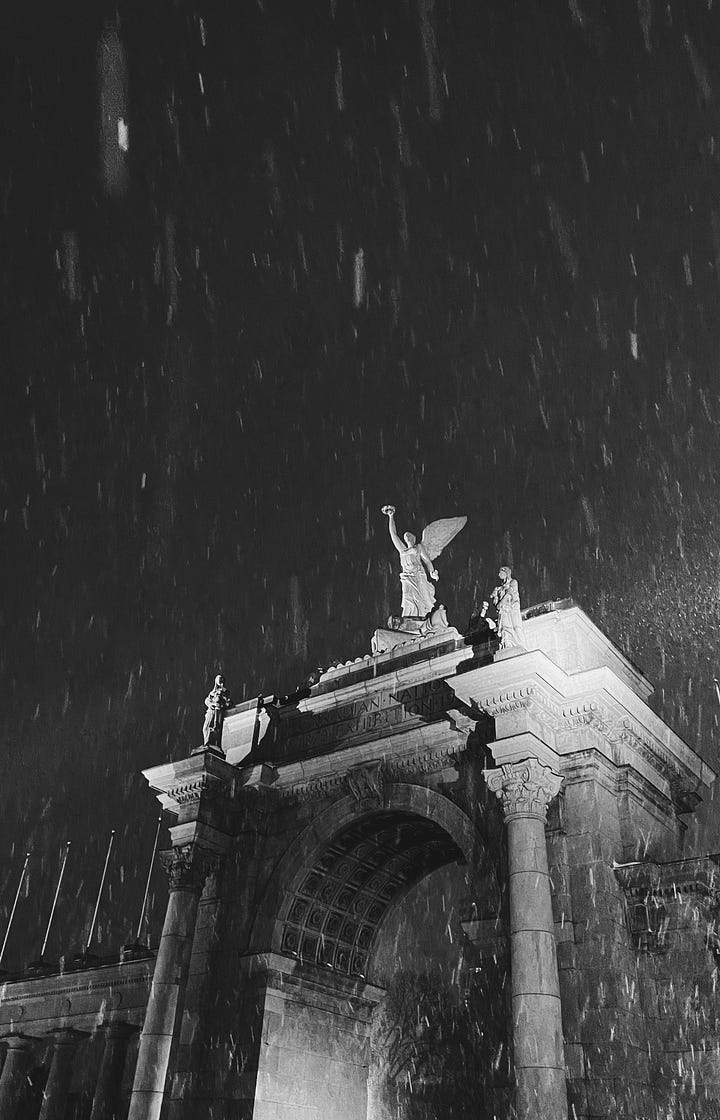

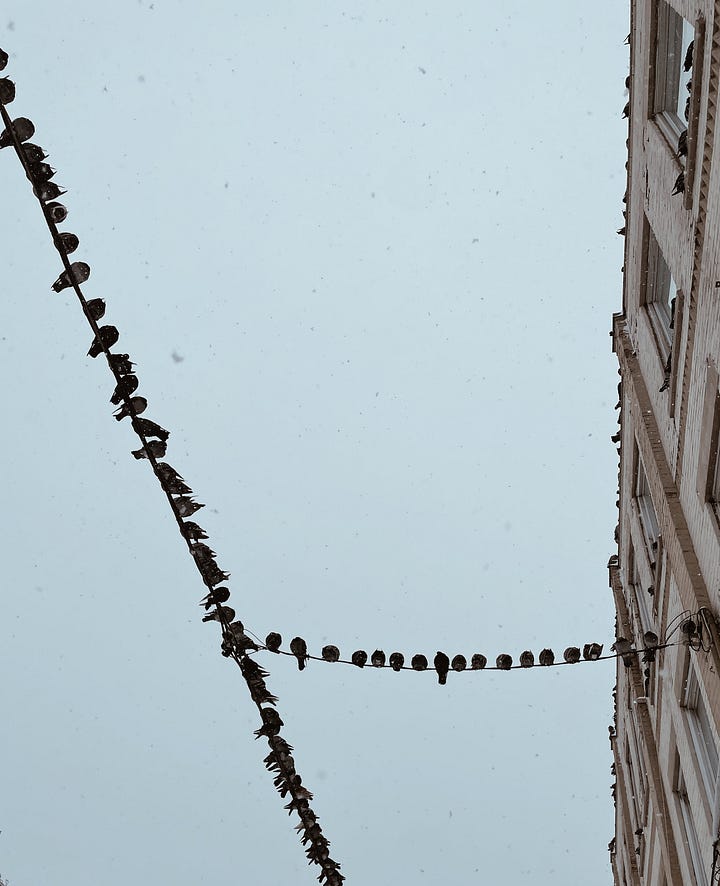

A winter snowstorm weekend in Toronto, Ontario.
Ahistorical since Jane Austen was before Whitman, but I couldn’t resist the alliteration.
"By the age of 70, he who doesn’t read will have lived only one life. He who reads will have lived 5000 years. Reading is immortality backwards."
— Umberto Eco
The Bible makes a similar, helpful distinction with money. Money itself is not evil. Rather, the love of money is evil. The only problem is, when you have a lot of money, it's hard not to begin to love it.
I read slowly, but I don't reread or revisit nearly enough. I don't pause and ponder how I could turn an abstract idea into an embodied ethos, something that becomes a part of everyday living. Especially with great books, one line could be endlessly expounded on.
It's not intuitive to take great ideas seriously. To treat great ideas with half the seriousness they deserve.
“Probably the most dangerous thing about an academic education–least in my own case–is that it enables my tendency to over-intellectualise stuff, to get lost in abstract argument inside my head, instead of simply paying attention to what is going on right in front of me, paying attention to what is going on inside me.”
—David Foster Wallace, This is Water
These two principles exist in an ecology, because excess consumption makes it harder to put anything into practice.
"Here’s something else that’s weird but true: in the day-to-day trenches of adult life, there is actually no such thing as atheism. There is no such thing as not worshipping. Everybody worships. The only choice we get is what to worship.
... If you worship money and things, if they are where you tap real meaning in life, then you will never have enough, never feel you have enough. It’s the truth. Worship your body and beauty and sexual allure and you will always feel ugly. And when time and age start showing, you will die a million deaths before they finally grieve you.
... Worship power, you will end up feeling weak and afraid, and you will need ever more power over others to numb you to your own fear. Worship your intellect, being seen as smart, you will end up feeling stupid, a fraud, always on the verge of being found out.
But the insidious thing about these forms of worship is not that they’re evil or sinful, it’s that they’re unconscious. They are default settings."
—David Foster Wallace, This is Water



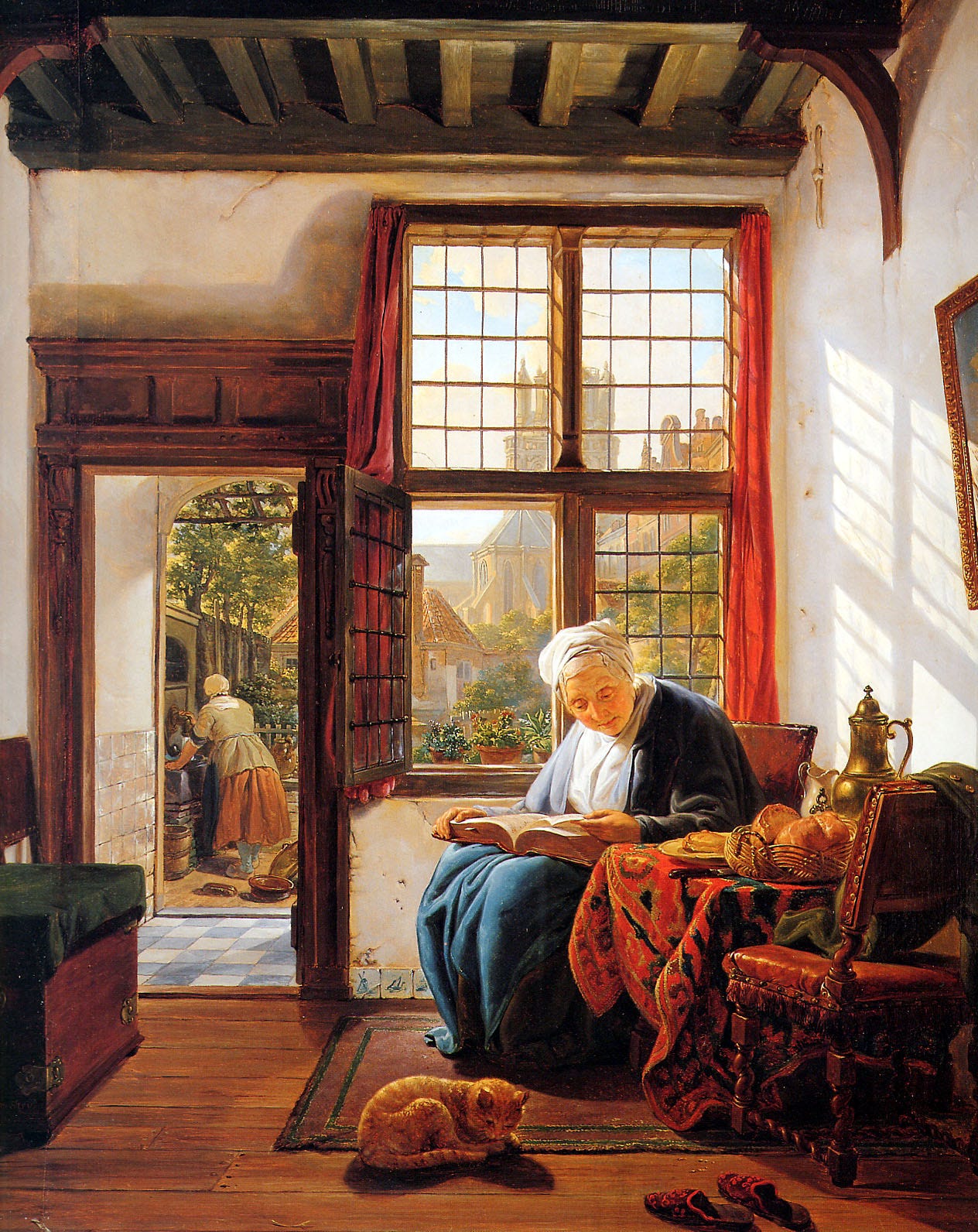
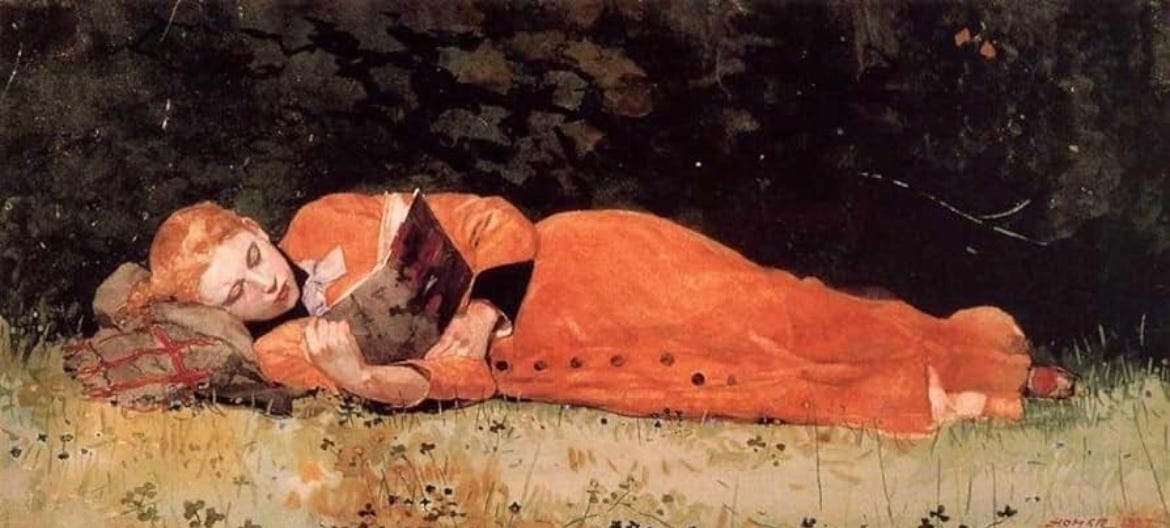
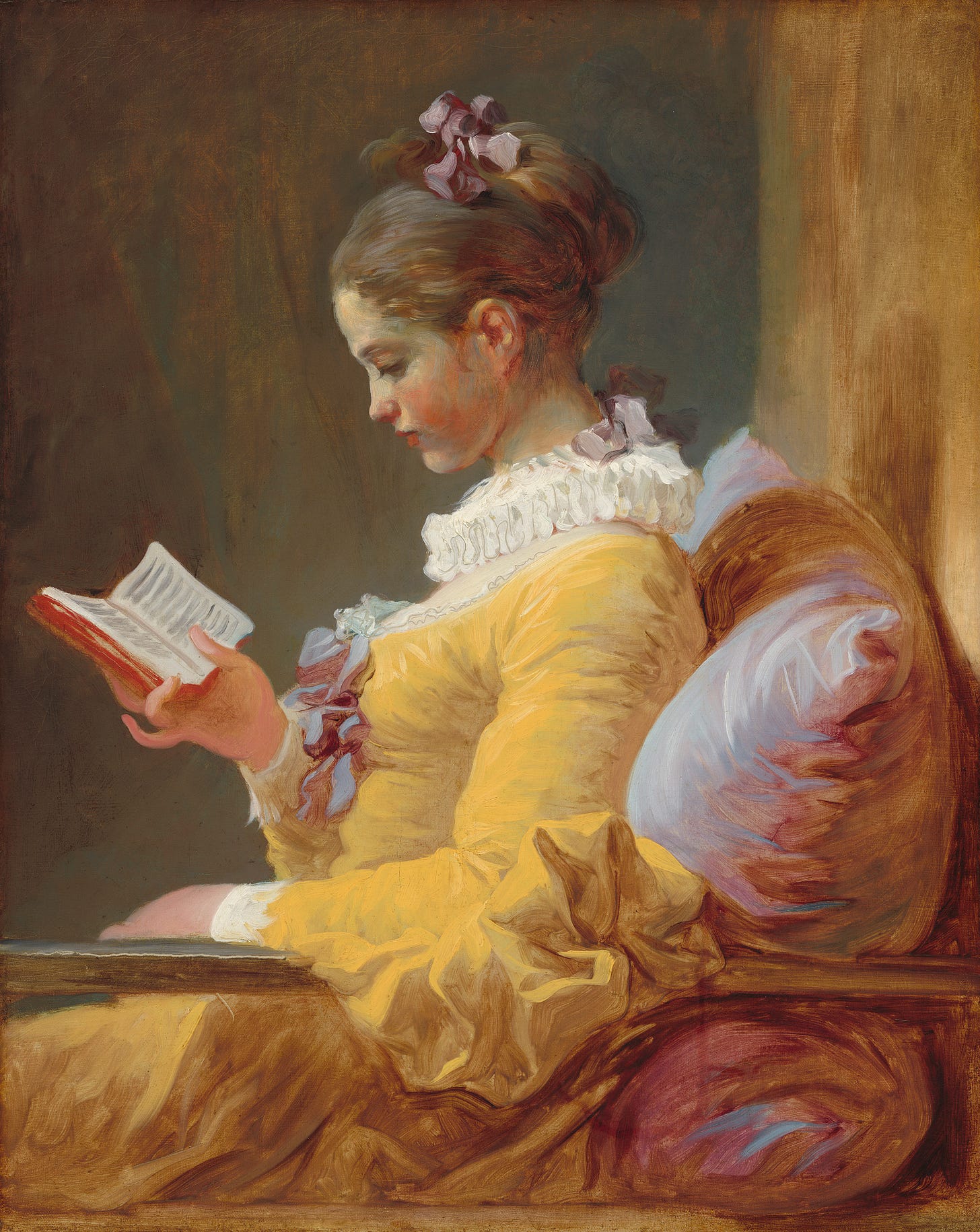

Thank you! I used to read a lot more books. I do have fond memories of packing a picnic and finding a nice spot outside to read (for a while, I would actually climb a tree and read up there with my sandwiches.) Now I read far fewer books but am much pickier about them.
I have noticed something among women of a similar demographic to me who read. Not sure how common it actually is. They read prolifically (like dozens of books a year) then use an algorithm like GoodReads to track and analyze their reading. Then report on what the website says! I find this so weird.
At this point in life (it wasn’t always so) the mark of a good book is it makes a big impression and challenges me to do something real in my life. Otherwise I can’t say I really see the point.
Would you rather live a full life and never crack open a book, or read all the great books and never leave your room?
I think it’s got to be the former. Work, art, and knowledge are pursued in service of experience. Most of human knowledge cannot be transmitted through text or language. Life must be lived.